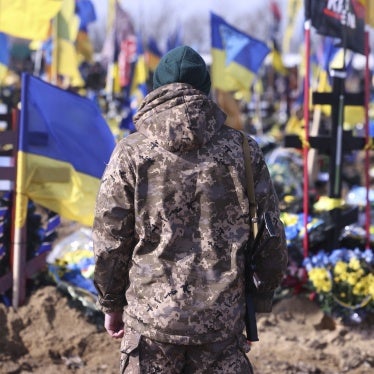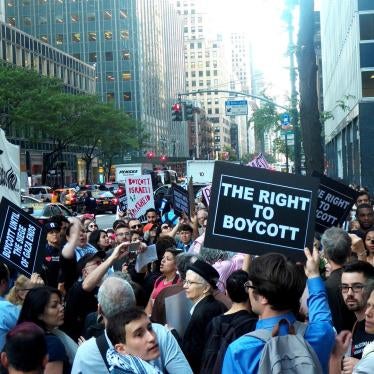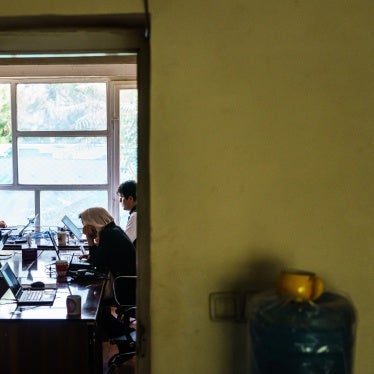(New York) — The U.N. Security Council should use its mission to West Africa to call on Nigeria to surrender Charles Taylor, the indicted former Liberian president, to Sierra Leone's U.N.-backed court for war crimes, Human Rights Watch said. The mission arrives in the region today on a seven-nation visit.
In a letter to the Security Council, Human Rights Watch said the mission presents an opportunity for the United Nations to reaffirm its commitment to human rights and the struggle against impunity in West Africa. In 2000 the Security Council passed the resolution that established the Special Court for Sierra Leone. The court has indicted Taylor on 17 counts of war crimes and crimes against humanity committed during Sierra Leone's 11-year civil war. Last year Nigeria granted Taylor asylum when the Liberian capital Monrovia came under siege by rebel forces.
"The Security Council established Sierra Leone's court for war crimes, but has remained silent on Charles Taylor," said Peter Takirambudde, executive director of Human Rights Watch's Africa Division. "Security Council members made a commitment to the victims of Sierra Leone's brutal war, so they need to explicitly call on Nigeria to hand over Taylor to the court."
Led by Britain's ambassador to the United Nations, Sir Emyr Jones Parry, the Security Council mission aims to identify and implement strategies for conflict prevention and peace-building in West Africa. Human Rights Watch also urged Security Council members to take specific steps to press human rights concerns in three other countries on the mission's itinerary: Côte d'Ivoire, Liberia and Sierra Leone.
In Côte d'Ivoire, despite a peace agreement meant to bring an end to the country's conflict, a return to war seems more possible, Human Rights Watch said. The peace process, initiated almost 18 months ago, is now deadlocked. Today Côte d'Ivoire is effectively split in two regions, with government-held areas in the south and territory controlled by rebels in the north. Civilians continue to suffer abuses by both sides and their associated militias, and from the economic hardship caused by the conflict.
"A return to all-out war in Côte d'Ivoire would have disastrous human rights consequences across West Africa," said Takirambudde. "The international community made serious efforts to bring about peace and stability in the region, but a chain is only as good as its weakest link. Today that link is Côte d'Ivoire."
The flow of arms to the conflict in Côte d'Ivoire has greatly heightened assaults on human rights as well as risks to regional stability. The Security Council should consider imposing an international arms embargo against all parties to the conflict and establishing a panel of experts to monitor the implementation of the embargo.
The military, gendarmes and police-joined by pro-government militias and youth groups-continue to commit abuses in the capital Abidjan and other parts of the country with total impunity. In March, a demonstration by opposition groups in Abidjan was met with a violent crackdown by the security forces and unidentified "parallel forces" that lasted for days. According to a U.N. report, at least 120 people were killed, many of them by indiscriminate fire by government security forces.
In early June, youth groups allied to and supported by President Laurent Gbagbo's political party staged violent demonstrations against the United Nations and French citizens in Côte d'Ivoire, threatening civilians and resulting in considerable loss of property. Security Council members should insist that pro-government militias and youth groups be disarmed and held accountable for criminal acts, Human Rights Watch said.
The conflict in Côte d'Ivoire also has the potential to draw in combatants-including child soldiers-from neighboring countries including Liberia, Guinea, Sierra Leone and Burkina Faso. Credible sources have reported that both the Ivorian government and the rebel coalition known as the New Forces (Forces Nouvelles) have been recruiting foreign combatants. The accounts also noted that state and non-state actors alike have easily bought the allegiance of these individuals with the promise of looted goods or a few dollars. These militias, private armies of thugs and itinerant groups of fighters reportedly commit abuses against-and often terrorize-civilians on a routine basis.
In Sierra Leone, Human Rights Watch urged Security Council members to privately and publicly pressure the government to take more concrete steps to combat corruption, which remains endemic in country. The government has largely failed to address the deep-rooted issues that gave rise to the conflict-endemic corruption, weak rule of law, crushing poverty, and the inequitable distribution of the country's vast natural resources.
"If the government doesn't take steps to combat corruption and bolster the rule of law, Sierra Leone could once again slide back into conflict," said Takirambudde.
In Liberia, Security Council members should insist that the National Transitional Government oppose a general amnesty to members of former warring factions, Human Rights Watch said. The Security Council mission should also speak out on the urgent need for a genuine accountability process for war crimes and crimes against humanity committed during Liberia's internal conflict.
Finally, Security Council members should demand accountability and action by West African governments that support armed groups responsible for recruiting and using child soldiers. Human Rights Watch welcomed the April 22 adoption of a U.N. Security Council Resolution 1539, which addresses the state and non-state actors named in the U.N. Secretary-General's 2003 report on children and armed conflict. The resolution calls on these parties to prepare concrete action plans by July 22 to end their recruitment and use of children as soldiers.
U.N.: Press Nigeria to Hand Over Charles Taylor
Your tax deductible gift can help stop human rights violations and save lives around the world.
Region / Country
Most Viewed
-

-
November 25, 2019
A Dirty Investment

-

-
April 27, 2021
A Threshold Crossed

-
May 2, 2024
Asia: 2024 Human Rights Press Awards


